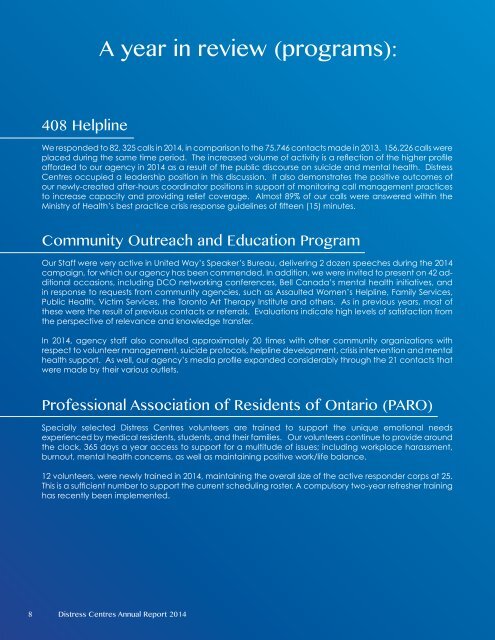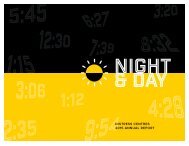Distress Centres Annual Report - 2014
You also want an ePaper? Increase the reach of your titles
YUMPU automatically turns print PDFs into web optimized ePapers that Google loves.
A year in review (programs):<br />
408 Helpline<br />
We responded to 82, 325 calls in <strong>2014</strong>, in comparison to the 75,746 contacts made in 2013. 156,226 calls were<br />
placed during the same time period. The increased volume of activity is a reflection of the higher profile<br />
afforded to our agency in <strong>2014</strong> as a result of the public discourse on suicide and mental health. <strong>Distress</strong><br />
<strong>Centres</strong> occupied a leadership position in this discussion. It also demonstrates the positive outcomes of<br />
our newly-created after-hours coordinator positions in support of monitoring call management practices<br />
to increase capacity and providing relief coverage. Almost 89% of our calls were answered within the<br />
Ministry of Health’s best practice crisis response guidelines of fifteen (15) minutes.<br />
Community Outreach and Education Program<br />
Our Staff were very active in United Way’s Speaker’s Bureau, delivering 2 dozen speeches during the <strong>2014</strong><br />
campaign, for which our agency has been commended. In addition, we were invited to present on 42 additional<br />
occasions, including DCO networking conferences, Bell Canada’s mental health initiatives, and<br />
in response to requests from community agencies, such as Assaulted Women’s Helpline, Family Services,<br />
Public Health, Victim Services, the Toronto Art Therapy Institute and others. As in previous years, most of<br />
these were the result of previous contacts or referrals. Evaluations indicate high levels of satisfaction from<br />
the perspective of relevance and knowledge transfer.<br />
In <strong>2014</strong>, agency staff also consulted approximately 20 times with other community organizations with<br />
respect to volunteer management, suicide protocols, helpline development, crisis intervention and mental<br />
health support. As well, our agency’s media profile expanded considerably through the 21 contacts that<br />
were made by their various outlets.<br />
Professional Association of Residents of Ontario (PARO)<br />
Specially selected <strong>Distress</strong> <strong>Centres</strong> volunteers are trained to support the unique emotional needs<br />
experienced by medical residents, students, and their families. Our volunteers continue to provide around<br />
the clock, 365 days a year access to support for a multitude of issues; including workplace harassment,<br />
burnout, mental health concerns, as well as maintaining positive work/life balance.<br />
12 volunteers, were newly trained in <strong>2014</strong>, maintaining the overall size of the active responder corps at 25.<br />
This is a sufficient number to support the current scheduling roster. A compulsory two-year refresher training<br />
has recently been implemented.<br />
8<br />
<strong>Distress</strong> <strong>Centres</strong> <strong>Annual</strong> <strong>Report</strong> <strong>2014</strong>






